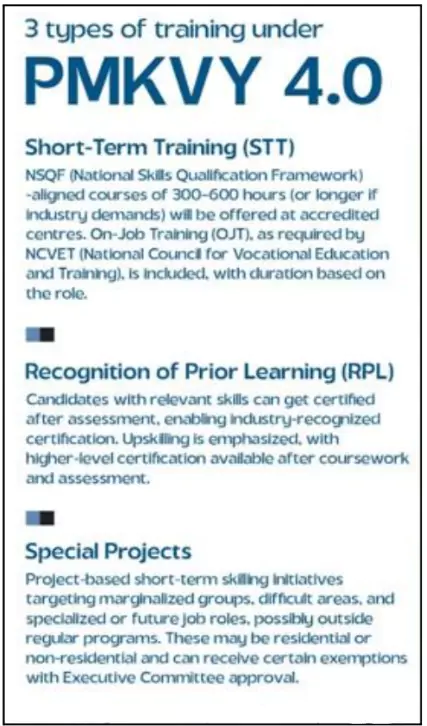The 10th anniversary of Skill India Mission was observed on 15th July, World Youth Skills Day.
About Skill India Mission
- Launch and Vision: Launched in 2015, Skill India aims to create a skilled workforce across sectors through short-term training, apprenticeships, and vocational education.
 Nodal Ministry: The Ministry of Skill Development & Entrepreneurship (MSDE)
Nodal Ministry: The Ministry of Skill Development & Entrepreneurship (MSDE)- Objectives of Skill India
- Enhance employability of youth
- Bridge the industry-skill gap
- Promote entrepreneurship and traditional crafts
- Ensure inclusion of women, SCs/STs, and other marginalized groups
- Prepare a future-ready workforce aligned with new-age technologies.
- Restructuring: In February 2025, the restructured ‘Skill India Programme’ was approved for 2022-23 to 2025-26 the restructured ‘Skill India Programme’ was approved for 2022-23 to 2025-26, merging Pradhan Mantri Kaushal Vikas Yojana 4.0 (PMKVY 4.0), the Pradhan Mantri National Apprenticeship Promotion Scheme (PM-NAPS), and the Jan Shikshan Sansthan (JSS) Scheme into a single Central Sector Scheme.
Key Initiatives under Skill India Programme
- Pradhan Mantri Kaushal Vikas Yojana (PMKVY): Flagship short-term training programme launched in 2015.
- Focuses on certification-based training with monetary rewards and Recognition of Prior Learning (RPL).
- Jan Shikshan Sansthan (JSS): Targets non-literates, school dropouts, and marginalized women aged 15–45 with vocational skills in rural/urban poor areas.
- National Apprenticeship Promotion Scheme (NAPS): Offers stipend support and promotes on-the-job training in industries.
- Skill India Digital Hub (SIDH): Digital platform integrating education, employment, and entrepreneurship ecosystems, enabling Aadhaar-based tracking and performance-linked payments.
- Skill Hub Initiative (SHI): Integrates vocational education with formal education through school and college infrastructure.
- PM Vishwakarma Yojana: End-to-end support for traditional artisans including training, credit, toolkits, and digital marketing.
- Deen Dayal Upadhyaya Grameen Kaushalya Yojana (DDU-GKY): Focuses on diversifying rural household income and training youth for wage employment.
- Rural Self Employment and Training Institutes (RSETIs): Bank-led initiative offering residential entrepreneurial training and credit linkage for rural youth.
Achievements of Skill India
- Massive Training Outreach: Over 1.6 crore youth have trained under PMKVY since 2015.
- Over 6 crore citizens have been trained across all schemes under the Ministry of Skill Development and Entrepreneurship (MSDE) since 2014.
- Gender and Social Inclusion: 45% of PMKVY trainees are women, with significant representation from SCs, STs, and OBCs.
- Sectoral and Technological Expansion: Skill training expanded to include AI, Robotics, IoT, Mechatronics, and Drone Technology.
- Special Projects: They were designed to include the marginalised sections.
- Examples include training of 2,500 Bru tribes, jail inmates, and Namda craftswomen in J&K.
- Effective Apprenticeship Promotion: Over 43.47 lakh apprentices engaged under PM-NAPS in partnership with 51,000+ establishments.
- PM Vishwakarma Scheme Performance: Over 2.7 crore applications received and 29 lakh registered by July 2025.
Challenges in Realising the Vision of Skill India
- Low Placement Rates: Only 42.8% placement rate reported under PMKVY’s Short-Term Training (STT) component till PMKVY 3.0.
- Digital Divide and Infrastructure Gaps: Limited access to digital resources in rural and remote regions hinders online skill delivery.
- Industry-Relevance and Curriculum Gaps: Training curricula often lag behind rapidly changing industry demands in emerging tech sectors.
- Fragmented Implementation: Overlapping schemes and governance structures reduce coordination and overall efficiency.
- Quality Assurance Deficits: Variations in trainer quality and institutional standards affect skill outcomes and employability.
Recent Initiatives to Address Challenges
- Launch of Skill India Digital Hub (SIDH): A unified digital platform linking skilling, education, employment, and entrepreneurship, with performance-based payments.
- Academic Integration through ABC : Under PMKVY 4.0, Academic Bank of Credits (ABC) allows credit transfer between skill and formal education.
- Creation of Centres of Excellence: Two new centres established at NSTIs in Hyderabad and Chennai for high-end instructor training in June 2025.
- Focus on Outcome-Based Monitoring: Aadhaar-linked verification, digital certification, and placement tracking introduced for transparency and accountability.
Way Forward
- Enhance Industry Linkages: Deepen industry participation in curriculum design, apprenticeships, and certification.
- Prioritise Digital Infrastructure Expansion: Invest in digital labs, connectivity, and devices in rural skilling institutions to bridge the digital gap.
- Mainstream Vocational Education: Integrate vocational courses into school curricula to build early familiarity with trades and crafts.
- NEP 2020 provisions for vocational training is a step in the right direction.
- Strengthen Monitoring and Feedback Loops: Implement real-time monitoring, periodic assessments, and feedback mechanisms to improve course quality and relevance.
Conclusion
The Pradhan Mantri Kaushal Vikas Yojana (PMKVY) has grown into a transformative national movement for youth empowerment through skill development.
To fully realize its vision, addressing systemic challenges and reinforcing innovation, digitalization, and inclusivity will be key as India progresses towards a knowledge-driven, skilled economy.
![]() 16 Jul 2025
16 Jul 2025

 Nodal Ministry: The Ministry of Skill Development & Entrepreneurship (MSDE)
Nodal Ministry: The Ministry of Skill Development & Entrepreneurship (MSDE)